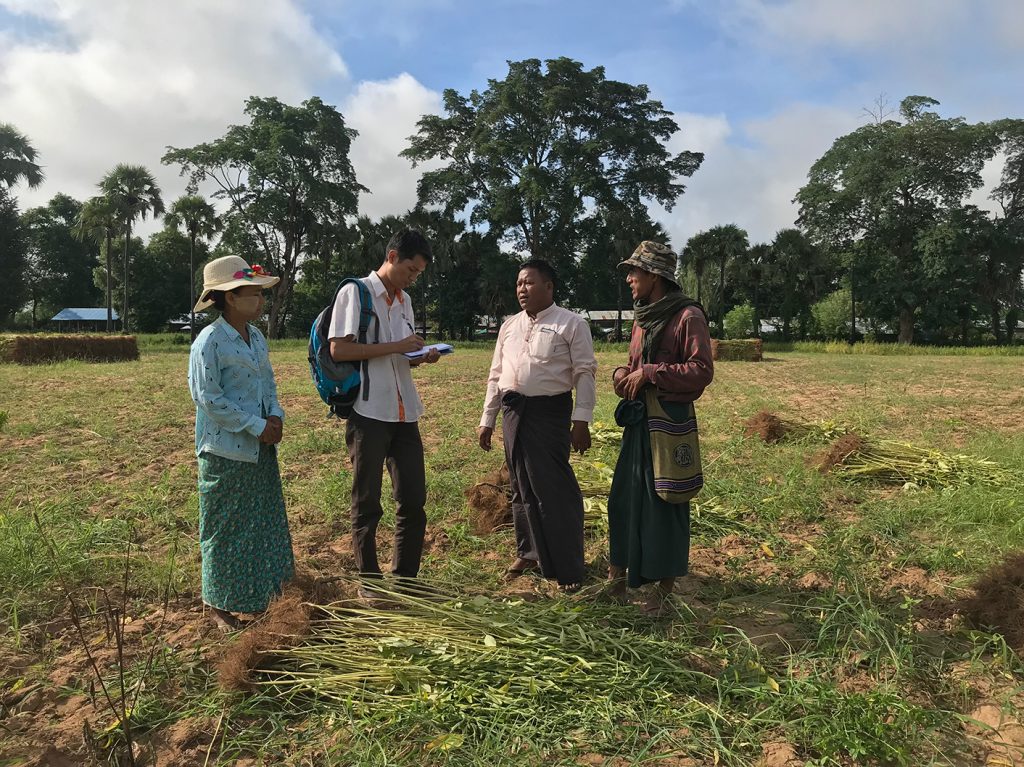Khin Zaw Tun: Working to strengthen Myanmar’s agricultural sector
Posted: 13 July 2021
Australia Awards alumnus Khin Zaw Tun is determined to strengthen Myanmar’s agriculture sector and promote farmers’ livelihoods. He has worked in rural and remote areas of the country for many years to improve farmers and peasants’ working conditions.
In 2017, Khin Zaw Tun completed a Master of Agricultural Science at the University of Queensland through an Australia Awards Scholarship. This experience enabled him to expand his knowledge of contemporary agricultural practices. “My master’s degree armed me with updated agricultural techniques, which is helpful for the agriculture sector as well as for my career,” he says.
During his study, Khin Zaw Tun found an elective course on value chain management to be particularly informative. “The course brought clear understanding to me about the agriculture sector in Myanmar,” he says. “It equipped me with technical knowledge of implementing value change management for smallholder farmers in Myanmar.”
After returning from his Scholarship in Australia, Khin Zaw Tun joined development organisation ICCO Myanmar as a project manager. He oversaw the ‘Pulses, People, Planet and Profit (P4)’ project, which aimed to improve the mung bean value chain in Myanmar to increase access to markets for farmers and suppliers, and to increase the productivity and quality of mung bean production. The three-year project was implemented in Yangon and Magway in collaboration with a range of stakeholders.

Khin Zaw Tun (pictured second to left) undertaking a field inspection and interviewing seed farmers
“Mung beans have become a key pulse product for export markets nowadays,” explains Khin Zaw Tun. “It can bring benefits for smallholder farmers if they can produce mung beans of export quality and link up with export markets. So, we empowered the mung bean farmers from Yangon and Magway to work in collective action, do collective marketing, get price incentives and increase their mung bean yield.”
The project worked with partner organisations to provide technical support for farmers in good agricultural practice (GAP) training, “which is critical for productivity and quality,” says Khin Zaw Tun. “Next, we organised smallholder farmers to collaborate and share information with each other so that they could attain bargaining power.”
Applying GAP, farmers produce premium products to access new markets. “With GAP, pulse farmers could diversify the export market. Mung beans main export locations are the European Union, Japan and ASEAN countries. Recently, the export market for mung beans has broadened to the United States and Russia.” Khin Zaw Tun notes that this broadening of the export market was a direct outcome of the P4 project.
Another significant component of the project was that ICCO provided lobbying and advocacy training to the mung bean farmer groups in Yangon and Magway regions, giving participants hands-on experience in formulating action plans on lobby issues. As a result, the participants improved their skills in advocating for mung bean farmers’ interests at township and regional levels.
The impact of the lobbying and advocacy training has been significant. “Trained farmers provided input and ideas on making key policy recommendations for the development of the pulses and oilseeds sectors,” explains Khin Zaw Tun. “Farmer representatives from the Yangon and Magway regions were able to express their challenges, especially on pesticide law, fertiliser law, farmer association registration and market accessibility.”
A significant development occurred in 2019 when farmers involved in the project met the union-level Agriculture, Livestock and Rural Development Committee of the House of Representatives to raise their voices. “That was the farmers’ collective action for policy advocacy. They became empowered,” Khin Zaw Tun says with pride.
Agriculture is the backbone of the Myanmar economy and the sector could play a key role in the country’s economic development. “Seventy percent of the population lives in rural areas,” explains Khin Zaw Tun. “Most of the farmers in Myanmar are smallholder farmers, who need expertise and support to improve the quality and add value to agricultural products.
“I want to contribute my expertise to agricultural and rural development in Myanmar.”
ICCO’s 3-year project concluded at the end of 2020 and Khin Zaw Tun is delighted with the project’s success in improving the mung bean value chain in Yangon and Magway.
For more information about the P4 project, watch this video and read the project case study.